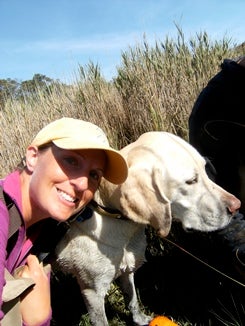
- PhD Completion: December 2012 - Quantifying the effects of tidal restrictions and plant invasions on resident fish in Atlantic coast salt marshes
Biography
Since graduating from CIIP, Kim received several grants to fund her dissertation research including an Environmental Protection Agency, Science To Achieve Results (STAR) Graduate Fellowship, a National Oceanic and Atmospheric Administration, National Estuarine Research Reserve (NERR) Graduate Research Fellowship, and a Philanthropic Educational Organization (PEO) Scholar Award. She spent several years collecting fish and plants for her research and many months in the lab running samples, resulting in data that allowed her to quantify the effects of tidal restrictions and plant invasions on the health of a fish species at the base of the food web in New England salt marshes. In the latter years of her PhD program,sheI was fortunate to work with and mentor undergraduate and post-graduate students in the laboratory and field as well as through her work as a Teacher’s Assistant. In 2011, Kim became a member of PEO, which connected her with a group of women whose main focus was to promote and raise funds to support women’s education projects worldwide. This was one of the most rewarding experiences of her graduate career and she looks forward to working with the organization and these dedicated ladies in the future.
Kim graduated from URI in December 2012 and immediately moved to Flagstaff, Arizona with her husband Nathan and white Labrador retriever Bailey. She accepted a 2-year postdoctoral position as a Research Biologist with the United States Geological Survey, Grand Canyon Monitoring and Research Center (GCMRC). Although this position has temporarily taken Kim away from the coast, she wanted to expand her knowledge of environmental flows and ecohydrology since estuarine biota in coastal environments are influenced by water allocation and management decisions across the terrestrial landscape. Instead of working in tidally restricted marshes, she is now working in a restricted river system where releases from the Glen Canyon Dam are used to manage Colorado River biota in the Grand Canyon. Her primary project is to assess the degree to which hydropower dam operations have influenced the size structure of salmonids in “tailwater” systems that develop downriver of dams across the Western United States. In addition, she is working on several projects that aim to understand how environmental flows and associated biological factors influence the physiological condition of an introduced trout species that is important to recreational anglers in the Colorado River. Along with several colleagues, she is helping to develop a protocol to monitor the health of endangered fish species in the Little Colorado River using Bioelectrical Impedance Analysis (BIA), a technology that can be used to assess the condition of fish in a non-lethal manner.
Some people might hear “Arizona” and think “desert” and “no water”. To some extent, that is true for the state of Arizona. However, Kim and Nathan moved to Flagstaff, which is a town that resembles Boulder, CO with a monsoon season that lasted 3 months last year (it resembled Seattle for much of the summer!). In addition, they get >100 inches of snow a year (one of the snowiest cities in the US!), so Nate and Kim are enjoying the endless skiing, hiking, and snowshoeing activities in their backyard (7,000-12,000 ft above sea level). In March, they adopted a second white Labrador retriever (Gunner), so they have two dog ‘kids’ now. Although their time in Arizona is limited and they’ll move back to the coast after Kim’s position ends, Kim and her family are enjoying the Southwest and its endless outdoor activities and stunningly beautiful National Parks.
Kim’s words of wisdom: “You are the author of your own life story. Pursue your dreams, be passionate about your work, and don’t be afraid to cross disciplinary lines in order to learn everything you can about the ecosystem you work in. In nature, everything is connected.”
Selected Publications
Click here for full Curriculum Vitae
